-
Third World First is born
1969
Third World First (as we were then named) was set up at the end of 1969 by students involved with Oxfam. We raised a lot of money for overseas projects by asking students to sign up to regular standing order donations - something that was groundbreaking at the time - and as these were the days of student grants, many students voluntarily offered 1% of their grant money as a self imposed tax.
Recently we were contacted by someone who was involved in the '70s and still keeping tabs on our work today! He shared some scans of some posters he had found:

-
New Internationalist is launched
1973
Former members of Third World First launch the New Internationalist magazine. It's gone from strength to strength and is one of the leading independent media organization dedicated to socially conscious journalism and publishing.
-
People & Planet force Pepsi out of Burma/Myanmar
1997
Pepsi's bottling plant in Burma was helping encourage tourism to the military controlled state where political prisinors were often held in dog cages. Aung San Suu Kyi's government in exile had called to help get Pepsi out. After less than just six months of campaigning by People & Planet (then Third World First), Pepsi pulled out. Aung San Suu Kyi sent a fax thanking students for their solidarity action.
-
New democratically chosen name: People & Planet
1998
A democratic process led to a new name, People & Planet.
The new name was announced to an audience of about a thousand students at our national Shared Planet event. As well as moving away from the out-dated concept of a "third world", the new name communicated our holistic and radical analysis: humans are not independenent of the planet we live on. At a time when other organisations tended to focus just on poverty, or just on human rights or just on environmental issues, we led the way in seeing all these issues as interlinked.
-
Ethics for USS campaign success
1999After a sustained two-year campaign with university staff and students our Ethics for USS campaign persuaded the £20 billion lecturers’ pension fund to adopt a socially responsible investment policy. They were the first big pension fund in the UK to adopt a socially responsible investment policy.
-
Jubilee 2000 campaign success: Over £20 billion debt cancellation agreed.
2000After 2 years campaigning as part of the Jubilee 2000 campaign coalition, over £20 billion of debt cancellation was agreed at international summits in response. Students in the People & Planet network delivered petitions with 80,000 signatures to the government - the second-largest total generated by any organisation.
-
Stop Esso campaign successes
2002 - 2003
We helped organise and took part in the second Stop Esso day - 4,000 people protested about the influence Exxon/Mobil was exerting to prevent the US from signing up to the Kyoto Protocol.
Esso cancelled their university recruitment tour after two years of P&P campaigning.
-
Green Electricity campaign success: 20 fold increase in use
2003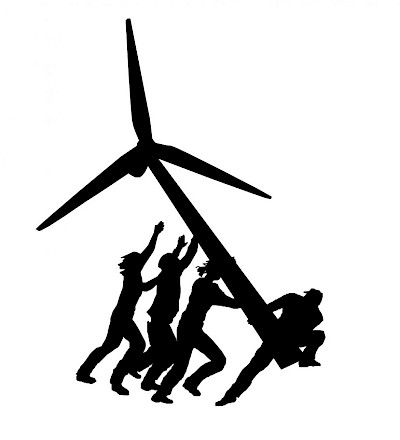
Our Green Electricity Campaign concluded having resulted in a twenty fold increase in the number of universities buying renewable electricity - saving 275,000 tonnes of carbon dioxide being released every year. The end of this campaign launched a new and wider Going Greener campaign on sustainability in universties.
-
Stop GATS campaign success on defending education.
2004
The government and EU conceded to the demands of our Defend Education - Stop GATS campaign by deciding not to include higher education in the profit-driven free trade treaty.
Later we would learn what a huge impact our campaigning actually since there were more submissions on education than any other issue! The government concluded: “in the light of the comments received, the EC’s offer includes no new commitments in educational services.” In other words: they admit we won the argument.
The General Agreement on Trade in Services (GATS) was being negotiated in the World Trade Organisation (WTO). Launched in 2000, the negotiations would conclude at the end of 2004. Higher Education was one of the many service sectors which some countries want to see covered by binding free trade rules, which would have opened it up to foreign competition by removing `barriers´ to free trade such as government regulations and subsidies.
In-depth research by People & Planet revealed that GATS would impose binding and effectively irreversible free-market rules on our Higher Education system. This would plunge universities into fierce competition in the global marketplace and could result in much higher fees, the closure of `unprofitable´ courses, lower quality, and threats to academic freedom. Higher Education is still in danger because the GATS treaty has an in-built commitment to keep expanding its reach to ever more services.
Guy Hughes, Head of Campaigns at People & Planet, added: “This victory needs to be put in context. Vital services in poor countries and the EU are still being aggressively targeted to be opened up for exploitation by big business through the current negotiations. Higher Education, and all other vital services worldwide, will not be permanently protected unless GATS either collapses or is completely rewritten.”
-
G8 committed to achieving universal access to treatment by 2010
2005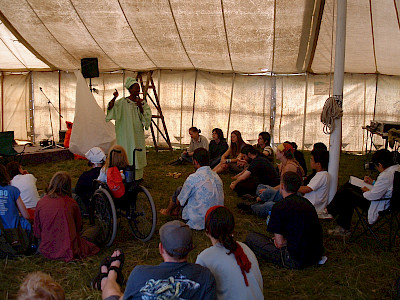
The G8 came to Scotland - People & Planet were there to meet them with our Summer Festival, which included key note speakers, skills workshops and campaign actions:
- Intensive campaigning before and during the G8 summit led to a major success for our AIDS campaign as the G8 committed to achieving universal access to treatment by 2010. We continued the campaign for several years.
- 250 students paid a visit to Grangemouth oil refinery with Friends of the Earth Scotland. In the company of eight G8 ‘mermen’, a giant inflatable dinosaur, and a variety of sea creatures, we had a beach-party as the oil refinery sank beneath blue fabric waves. Grangemouth was chosen because it contains four of Scotland’s top ten carbon dioxide emitters, yet ironically is at sea-level, leaving it vulnerable to the effects of climate change.
- Numerous workshops, speaker sessions and fire-side conversations focused on the fundamental injustices in the structure of the international system. We considered the importance of trade as a MAKEPOVERTYHISTORY demand, and how the value of aid and debt relief is undermined by conditions which force trade liberalisation and prioritise the interests of Western corporations over the interests of the poor. Although the G8 made no new trade commitments we continue to campaign for a change in the rules to help poor people and protect the environment.
-
People & Planet helped secure the world's first Climate Change Act
November 2006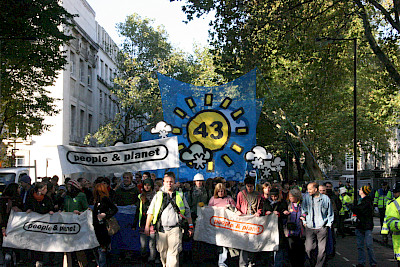
After months of campaigning, the Government committed to introducing a Climate Change Bill at the state opening of Parliament today.
David Miliband, the Secretary of State for the Environment, said in a recent article that the Bill would “provide a framework of certainty and confidence for the climate change debate.” While the details of the Bill are still to be worked out, David Miliband has said that the government “will put the target to reduce carbon emissions by 60 per cent in 2050 on the statute book and consider whether we should adopt further interim targets.”
The announcement comes after months of campaigning for a Climate Bill by Stop Climate Chaos. People & Planet groups around the country, including Edinburgh and Aberystwyth, have lobbied dozens of MPs, massively increasing the pressure on the Government to introduce the Bill. On 4 November, People & Planet’s Carnival of Climate Chaos made a colourful and passionate contribution to the I Count event in Trafalgar Square, where 25,000 people gathered to demand real action on climate change.
And it’s clear that we did make an impact. Immediately after the Carnival and I Count event in Trafalgar Square, Stop Climate Chaos was invited to send representatives to a breakfast meeting with Tony Blair. People & Planet student Hannah Smith went along to demand that the Climate Bill should include targets to reduce emissions by at least 3% a year. She also handed over the 1,537 Stop Climate Chaos pledge cards collected by People & Planet so far, demanding tough action by the Government and demonstrating the commitments that have been made by individuals to cut their own carbon.
So, there will be a Climate Change Bill. This is great news. It means that Parliament can now act to tackle climate change. However, the Bill must be a robust one. As Hannah pointed out to the Prime Minister, it needs annual targets to ensure we get on track (rather than defer action) and to ensure total emissions are kept within limits. And it must be passed through Parliament as quickly as possible. There is no time to delay action. The Government must act decisively and soon. People & Planet will keep the pressure on to make sure that they do.
Read the Queens Speech.
-
Campaign Success: Government Introduce Climate Bill
After months of campaigning, the Government committed to introducing a Climate Change Bill at the state opening of Parliament today.

People & Planet students hand in pledges at No 10 and demand a Climate Change Bill
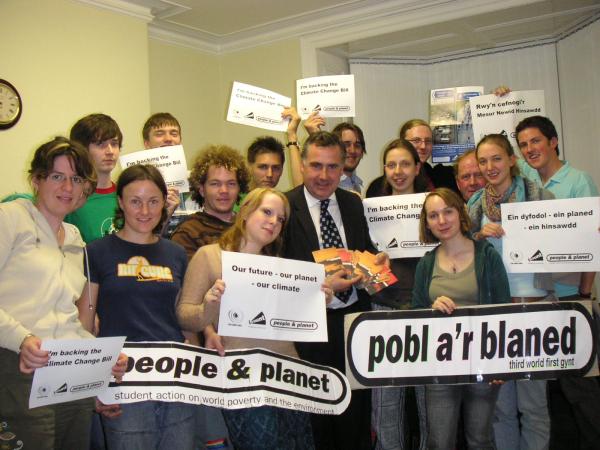
Aberystwyth Uni group with MP
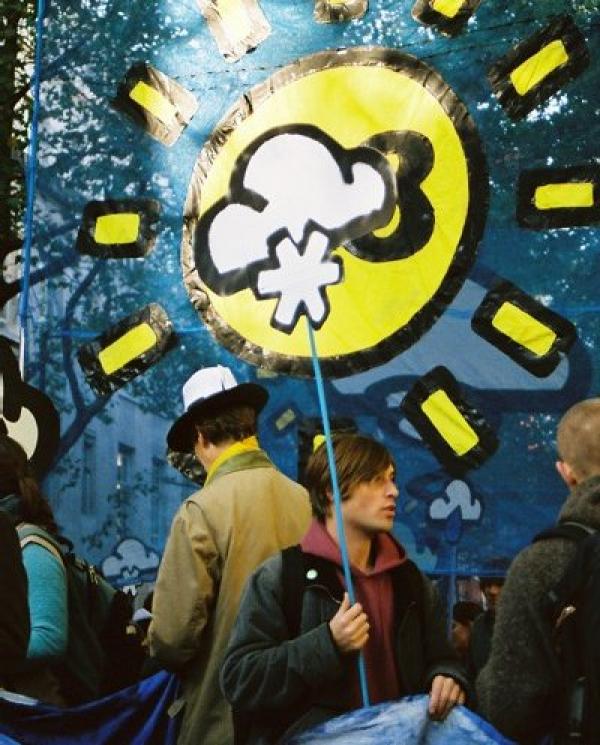
Weather at the Carnival of Climate Chaos
David Miliband, the Secretary of State for the Environment, said in a recent article that the Bill would “provide a framework of certainty and confidence for the climate change debate.” While the details of the Bill are still to be worked out, David Miliband has said that the government “will put the target to reduce carbon emissions by 60 per cent in 2050 on the statute book and consider whether we should adopt further interim targets.”
The announcement comes after months of campaigning for a Climate Bill by Stop Climate Chaos. People & Planet groups around the country, including Edinburgh and Aberystwyth, have lobbied dozens of MPs, massively increasing the pressure on the Government to introduce the Bill. On 4 November, People & Planet’s Carnival of Climate Chaos made a colourful and passionate contribution to the I Count event in Trafalgar Square, where 25,000 people gathered to demand real action on climate change.
And it’s clear that we did make an impact. Immediately after the Carnival and I Count event in Trafalgar Square, Stop Climate Chaos was invited to send representatives to a breakfast meeting with Tony Blair. People & Planet student Hannah Smith went along to demand that the Climate Bill should include targets to reduce emissions by at least 3% a year. She also handed over the 1,537 Stop Climate Chaos pledge cards collected by People & Planet so far, demanding tough action by the Government and demonstrating the commitments that have been made by individuals to cut their own carbon.
So, there will be a Climate Change Bill. This is great news. It means that Parliament can now act to tackle climate change. However, the Bill must be a robust one. As Hannah pointed out to the Prime Minister, it needs annual targets to ensure we get on track (rather than defer action) and to ensure total emissions are kept within limits. And it must be passed through Parliament as quickly as possible. There is no time to delay action. The Government must act decisively and soon. People & Planet will keep the pressure on to make sure that they do.
Read the Queens Speech.
Find out more about the I Count campaign.
-
People & Planet took UK Government to court over carbon-intensive investments such as tar sands.
2009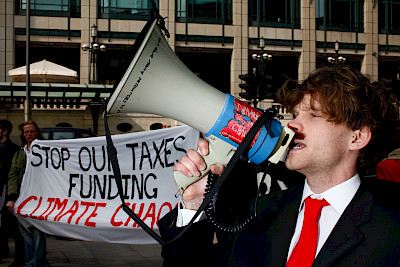
We took the government to court over RBS’s carbon-intensive investments such as tar sands. The majority of RBS was then owned by the public and we argued that the government should be using its shareholding to invest in a low-carbon future not dirty fossil fuels. The High Court ruled that the Treasury can ignore climate change and human rights but the fight was not over and we continued to work towards our sustainable vision in our Ditch Dirty Development campaigning that followed.
A High Court judge blocked a request for permission to hold a Judicial Review over the Treasury’s lack of adequate environmental and human rights consideration of Royal Bank of Scotland’s investments.
“We’re incredibly disappointed with the court’s decision not to allow a full hearing on this important case and will be appealing the judgement. Essentially, the judgement means that RBS’ profits come before the climate and human rights of people.This is particularly hard to swallow after Gordon Brown’s soaring rhetoric on climate change yesterday. We’re incredibly angry to see that just one day later the Treasury outrageously argued that for a director of business to take environmental concerns into account would be a ‘burden’ and ‘handicapping’. Yet, this is precisely the kind of positive action that the government should be promotoing, if we are to believe one word of Gordon Brown’s speech yesterday.
-
1,200 Honduran garment workers got their jobs back
2009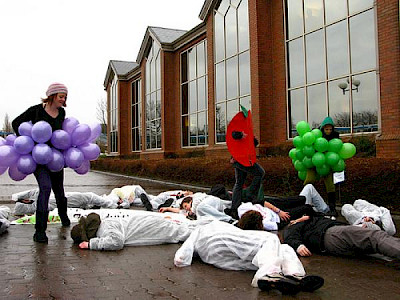
1,200 Honduran garment workers got their jobs back after Fruit of the Loom/Russell agree to reopen Honduran factory after ‘biggest student boycott since Apartheid’.
Fruit of the Loom's subsidiary Russell Athletic illegally closed its Jerzees de Honduras factory shortly after workers formed a trade union. The closure left 1800 people with families to feed and provide for, jobless. Reports from the Workers Rights Consortium and the Fair Labour Association concluded that the motive in closing the factory was, at least in part, to stop workers organising for fair conditions.
Students in the UK, USA and Canada responded by campaigning in solidarity with workers by pressuring their universities who sold branded Fruit of the Loom and Russell Athletic garments to boycott the corporation. 9 UK Universities and over 100 universities worldwide boycotted Fruit of the Loom/Russell, making it the largest garment boycott campaign in history.
This was in no way an overnight victory — it came after 10 years of building a movement that persuaded scores of universities to adopt detailed codes of conduct for the factories used by licensees like Russell. In addition, the students, sometimes through lengthy sit-ins, pressured their officials to create and finance an independent monitoring group, the Worker Rights Consortium, that inspected factories to make sure they complied with the universities’ codes. -
Students flood UK streets to demand real deal at Copenhagen
December 2009Thousands of young people joined The Wave protests in 2009 demanding tough action on climate change. As the historic UN climate talks opened in Copenhagen, young people called for “Climate Justice”. People & Planet students traveled from all over the country to attend from schools, colleges and universities. They led the march in mass “flashdances” and rolled a giant Wave machine through the streets of London.
Over 50,000 people dressed in blue flooded the streets of London and encircled parliament. There were Waves of people power on the same day across the UK and Ireland, with 13,000 people joining The Wave in Glasgow to make history in Scotland too. They came together to call on the UK to act fair and fast and protect the world’s poorest when negotiating a global climate treaty at the UN negotiations which open today.
"I thought the Wave was amazing as it was my first time taking part in a public demonstration. It was really exciting and eye opening to see the extent you have to go through to make a point and also the amount of people that showed up which was brilliant! The Wave also showed me how people can stand up for what they believe and actually get up and do something." Tonye Babudoh, 17, from the People & Planet group at City Islington College
-
Nike agrees to pay $1.5M severance pay to Honduran workers
2010
In January 2009, two factories in Honduras closed, leaving nearly two thousand workers without severance pay. These factories produced goods for Nike, the largest sportswear company in the world, but Nike denied any responsibility towards the workers. This could have been the whole story, but workers and students around the globe have been working together to achieve a groundbreaking victory against corporate power. After a year of campaigning, the Honduran workers were awarded cash compensation of $1.54 million.
The growing links between workers and students across national borders were central to this success. The Worker Rights Consortium (WRC) connected the disgruntled workers with US students by preparing a report on the situation, which they sent to more than a hundred American universities. United Students Against Sweatshops (USAS) mounted a huge pressure campaign telling Nike to “Just Pay It!” with waves of protests held outside Nike stores. Students at universities across the US got involved with actions and petitions. The student campaign went international when People & Planet got involved.
“It was less than a year ago that students from People & Planet and United Students Against Sweatshops came together to campaign across border in solidarity with Honduran Fruit of the Loom garment workers… Students are at the forefront of the anti-sweatshop movement, fighting in solidarity with workers for a world free of exploitation.” Student campaigner Matt Mcmullen
-
8 Student activists took part in Tarsands Youth Solidarity Exchange
2011We took a group of 8 student activists accompanied by two People & Planet staff and a film crew to Canada for the Tarsands Youth Solidarity Exchange project with the Beaver Lake Cree Nation. Seeing the destruction caused by the tar sands industry firsthand has inspired both Cree and UK students to redouble their efforts to stop further tar sands oil extraction on their traditional lands. The project also resulted in a feature length documentary Taking on Tarmageddon which was screened across the country to educate others about tar sands.
-
Going Greener campaign successes
Spring 2012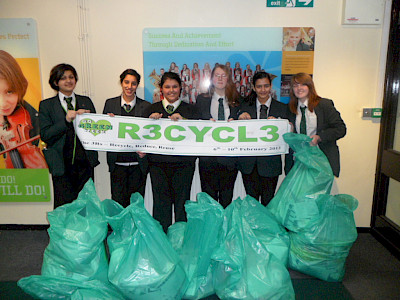
Our Going Greener project to create Transition Universities supported student-led environmental initiatives across the UK including:
- Training up and helping students at 12 universities to launch new Student Food Co-ops.
- Launching 'Big Green Makeover' home energy completions across the UK.
- campaigned for universities to set-up funding pots for student sustainability projects and ban bottle water.
The largest week of student action on climate change ever held - Go Green Week 2012 engaged over 140 universities, schools & colleges and over 20,000 staff and students.
Sustainability is about ethics, too
Thanks to pressure from our activists, the number of universities with ethical procurement policies increased from 26% to over 70% in one year.
Over 100 students wrote to the Bangladeshi Prime Minister demanding justice for the murdered Bangladeshi labour rights activist, Aminul Islam. After reporting that he was under surveillance by the police, Aminul disappeared one night in April 2012. His body was found on the following day, bearing unmistakable signs of brutal torture. Aminul was a senior organizer at the Bangladesh Center for Worker Solidarity (BCWS), an internationally respected labour rights organization.
-
Persuaded Government to abstain on EU Fuel Quality Directive vote
Autumn 2012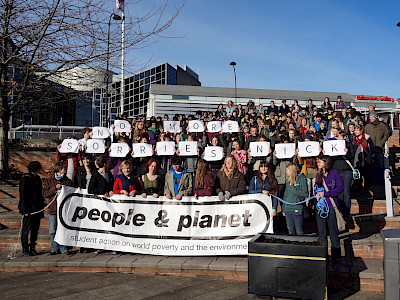
We persuaded the UK government to abstain from a key vote on the EU Fuel Quality Directive that would keep dirty tar sands oil out of Europe. Norman Baker was planning to vote No under intense pressure from Canadian lobbyists but over 16,000 emails & creative actions from students helped to shift the Government’s position. A huge win for people-power.
-
adidas agree to 'pay up'
April 2013Students and workers forced German sportswear giant adidas to compensate 2,700 former Indonesian garment workers who produced sports apparel at PT Kizone, an adidas supplier factory that closed down.
The settlement came after a powerful international campaign over adidas’s prior refusal to pay $1.8 million in unpaid severance pay following the closure of PT Kizone. The announcement came just days after students across the UK took to the high streets demanding that sportswear firm Footlocker drop adidas over its failure to pay workers.
"Infinite thanks… thanks to the solidarity of all [our] friends. Both in Europe and in America and even around the world…… we will continue to fight together to improve the plight of factory workers throughout the world." Aslam Hidayat, leader of the PT Kizone workers’ union.
-
Reversed Government's decision to remove climate change from curriculum
Summer 2013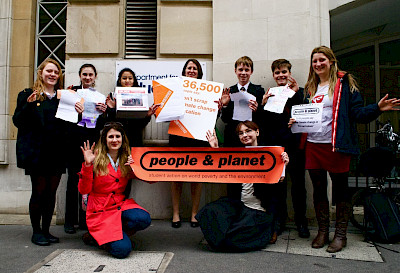
Education Secretary Michael Gove decided to drop climate change from the curriculum. People & Planet supporters joined thousands of people around the country in telling Gove and Energy Secretary Ed Davey not to be stupid on the climate, and managed to reverse their decision.
Over 66,000 people signed petitions to keep climate change in the curriculum. Pupils from across the country joined People & Planet’s Education Team at the Department for Education to hand in our petition telling Michael Gove not to cut climate change from the Geography curriculum for under 14s.
After months of campaigning by students and teachers all over the UK, Gove listened to our voices and announced he’ll drop plans to remove climate change from the school curriculum.
People & Planet’s Green Education Declaration for schools and colleges
Students in schools and colleges across the country were also transforming the education sector, using everything from photo petitions to college open days to clothes-swapping events to make your voices heard. As a result, this year saw the first 8 signatories to People & Planet’s Green Education Declaration for schools and colleges - a public commitment to get serious about the environment.
"We fully recognise our role as beacons of good practice and our duty to inspire positive sustainable behaviours in our students and the wider community. We aim to embed sustainability throughout our curriculum, and look forward to increasing environmental awareness among our students this year in our exciting collaboration with People & Planet." Harrow College
-
Launched Electronics Watch
2013As part of our Sweatshop Free campaign we launched a new democratically selected campaign called Electronics Watch to bring transparency and reform to public sector electronics supply chains across Europe. As part of this People & Planet assembled a coalition of 66 organisations across the world and successfully created a new organisation Electronics Watch, which aims to use cross-European public spending power to support workers in defending their rights in the electronics industry. The independent organisation started operations in 2015.
-
Fossil Free Campaign launched
October 2013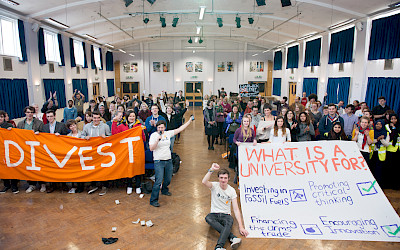
People & Planet launched the Fossil Free campaign to divest UK universities’ £5.2 billion investments in fossil fuels and sever their ties to an industry fueling the climate crisis.
In October 2013, we organised a high-profile tour of the UK with 350.org co-founder Bill McKibben which catapulted the issue of divestment onto media front pages and mobilised a whole new generation of student climate activists. Within a couple of months over 30 local groups had started campaigning for their universities to divest.
-
Edinburgh University commits to responsible electronics
13 May 2015
The University of Edinburgh became the first higher education institution in the UK to become a member of Electronics Watch.
-
Environmental Association for Universities and Colleges blacklists fossil fuel companies as sponsors
16 Feb 2016EAUC were accepting sponsorship from British Gas for their national conference where environment managers from UK universities and colleges come to discus how to make our institutions more sustainable.
After students and staff demanded they stopped the greenwash and drop them as a sponsor for all future events - they quickly blacklisted all fossil fuel companies from their events.
-
Undoing Borders campaign launched
7 July 2016The UK government is denying basic human rights through racist policies. In 2014, a policy to create a 'hostile environment' was implemented. We have seen not just the overt blatant physical borders come to the fore, but also the everyday borders that deny undocumented migrants basic human rights. Resulting in being denied access to health care, education and housing, falling hand in hand with the ever rising racist abuse towards people from a migrant background.
Student in the network launched the Undoing Borders campaign to build a movement fighting against the 'hostile environment' infringing on our campuses and collectively creating a new vision and future.
-
Advanced Procurement for Universities and Colleges affiliate to Electronics Watch
20 Jan 2017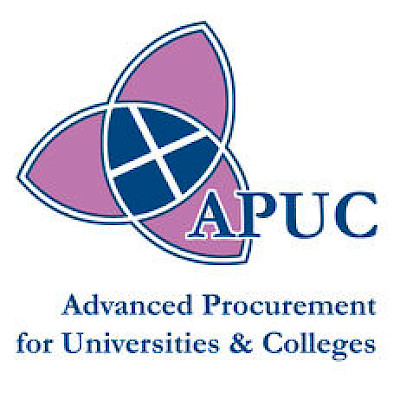
Electronics Watch celebrates its first full consortium affiliation, and tenth UK University. Advanced Procurement for Universities and Colleges (APUC), the purchasing consortium for Scotland's Universities and Colleges. All of APUC's 44 higher and further educational institutions became Consortium Affiliates of Electronics Watch through APUC. This was the first time a whole sector of public bodies in a country had affiliated, and demonstrated the push within the sector in Scotland to achieve a transparent and fair supply chain for the products they purchase.
-
UNISON becomes first UK Trade Union to join Electronics Watch
October 2017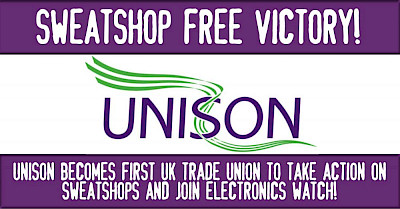
Public service union UNISON became the first trade union in the UK to ensure the electronics they purchase are independently monitored for workers’ rights violations. UNISON joined the growing number of institutions in Europe that have already affiliated to Electronics Watch.
-
Principles for ethical reporting on migration launched
3 Oct 2017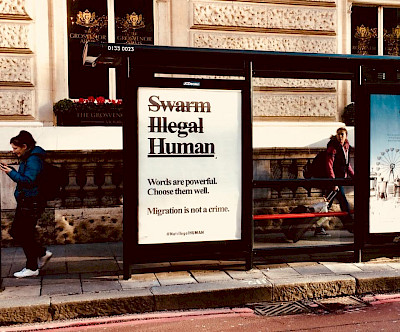
Over 150 journalists and politicians sign on to our new Principles for Ethical Reporting on Migration. We worked young migrants, Migrants' Rights Network and reporters to develop a set of ten principles that ask journalists and public figures signed up to, committing to working to change the way the media talks about migrants.
We want to shift the narrative in the mainstream by working with journalists to encourage these 10 principles of accurate and fair reporting on migration. To co-create a media that does not contribute to the ‘hostile environment’ that has been created in the UK. Our collective vision is to have a media that breaks down the everyday barriers to living life free from hostility and hate for people from a migrant background in the UK.
-
University of Edinburgh Divests all Fossil Fuels from £1bn Endowment
5 February 2018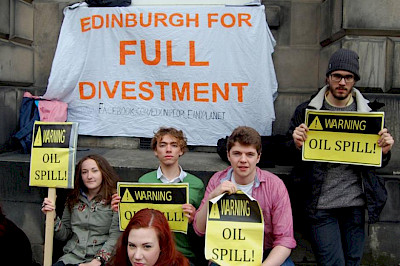
University of Edinburgh announced it would move its entire investment portfolio out of the fossil fuel industry over the next three years. The University currently holds £6.3million in fossil fuels companies: Total, Atlas Copco and BG Group. The University’s endowment is the third largest in the UK, behind Cambridge and Oxford, making the decision the largest full divestment of any UK university so far. This came after a long-running student campaign and the University's 2015 decision to divest from coal & tar sands following a 10-day occupation.
-
Glasgow becomes first university in Europe to divest from fossil fuels
8 October 2014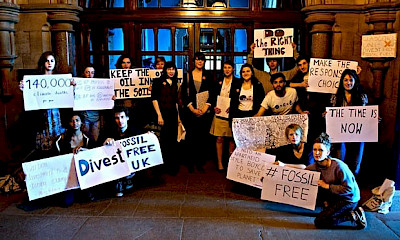
Glasgow University became the first academic institution in Europe to divest from the fossil fuel industry, in a turning point for the Fossil Free campaign!
After 12 months of campaigning, led by the Glasgow University Climate Action Society and involving over 1,300 students, the university court voted to begin divesting £18m from the fossil fuel industry and freeze new investments across its entire endowment of £128m.
“Students around the world are making it clear that the institutions entrusted to prepare them for the future cannot simultaneously bet against their future by profiting from corporations that plan to burn many times more carbon than our atmosphere can safely absorb. They are sending an unequivocal message that fossil fuel profits are illegitimate – on par with tobacco and arms profits – and that brings us a significant step closer to demanding that our politicians sever ties with this rogue industry and implement bold climate policies based on a clear, progressive ‘polluter pays’ principle.” Naomi Klein -
Over a quarter of UK universities divest from fossil fuels
22 Nov 2016
The number of UK higher education institutions vowing to exclude fossil fuel from investments grew to 43 - a significant milestone as it meant over a quarter of UK universities were now committed to divest from fossil fuels.
This result was a testament to the tireless work of thousands of Fossil Free activists across the country. Awareness-raising, holding demonstrations, publishing reports, engaging in direct action, carefully negotiating with managements; the campaign has been a fine example of tactical and strategic precision. Through delegitimising the fossil fuel industry we contributed to the social conditions that will facilitate the necessary political interventions to begin combating the greatest threat to life on Earth ever seen.
-
University fossil fuel divestment total tips £80 billion globally
17 Aug 2017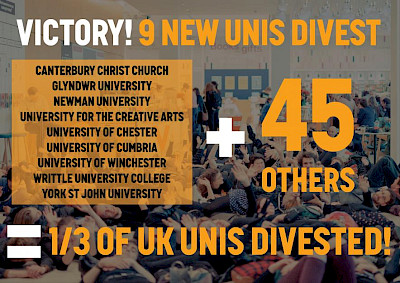
UK emerges as campaign’s world leader as nine new institutions announce commitments . Over a third of universities in the UK have made fossil free commitments, as nine new UK universities have committed to never invest in fossil fuel companies. This brings the total to fifty four institutions which have taken action to exclude fossil fuel companies from their investment portfolios.
As reinvestment discussions become more of a focus at institutions committing to divest from fossil fuels students are pushing for options that facilitate their direct participation in the just transition to a low-carbon world. This is through opening up dialogue about how to create a more democratic energy system and include such solutions as community energy initiatives on campus.
-
Divest Barclays Launch
5 July 2017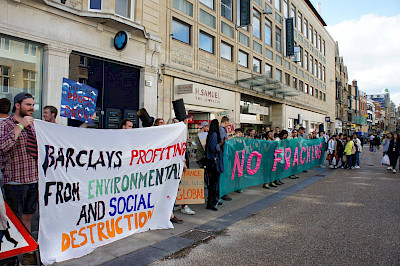
Barclays is a major investor in fossil fuel infrastructure across the globe it's time for them to halt their support for the fossil fuel industry before they crash the climate or the economy. Students in the network decided they would build a movement that will get unis to break ties with Barclays, build a mass boycott, end sponsorship deals and show Barclays up for the climate criminal that they are.
-
10 years of the People & Planet University League
14 Nov 2017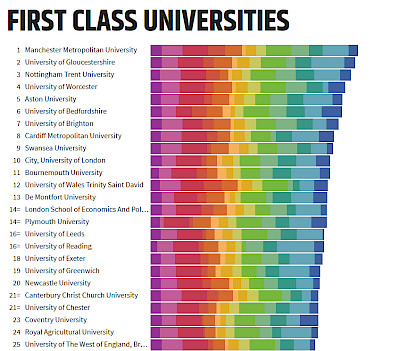
Campuses have come a long way in the 10 years of the student-led People & Planet rankings – but there are surprising fails.
Any ranking that puts Oxford and Cambridge near the bottom is bound to be controversial, and we faced a barrage of criticism over our first “green” university league table. A decade on, the ranking has stood the test of time, has expanded to include social justice and workers rights. It's credited with transforming sustainability on campus.
-
Trained and empowered over 400 further education students in rights, economics and campaigning
July 2018
We completed a 2 year Economic Justice Project including delivering workshops across 6 further education (FE) colleges.
Through our workshops young people with little knowledge of workers’ rights have gained the knowledge and confidence needed to challenge workers’ rights violations, especially around discrimination and zero-hour contracts.
-
Our college trainings reached a very diverse pool of participants, owing to being hosted in inner city colleges. 75% of participants described themselves as being from BAME (black and minority ethnic) backgrounds and 65% from working class backgrounds.
-
It was clear in the college workshops that very few students had heard of workers’ rights and unions, but both the qualitative and quantitative feedback suggests that students now have some knowledge and the tools needed to assert their rights as workers.
-
A training-the-trainers session was organised with a group of ten teachers, helping to ensure that the college training will continue to have an impact beyond the timeframe of our project.
The workshops were well received and feedback included:
-
94% of participants felt like they now understand their rights as workers;
-
92% felt like they know how they can use their rights to improve their working conditions;
-
85% felt confident to talk to others about their rights;
-
80% felt confident to ask for support if their rights aren’t being respected;
-
74% said they would join a union when they get a job.
People & Planet worked in partnership with Jubilee Debt Campaign and the work was funded by the Joseph Rowntree Charitable Trust.
-
-
Half of UK universities pledge to divest from fossil fuels
January 2020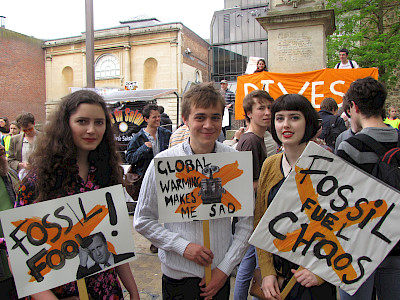
The Fossil Free campaign hits a major milestone with half of UK universities pledging to divest from fossil fuels. Author and environmentalist, Bill McKibben, says "People & Planet in the UK have done a better job of convincing institutions to divest than anyone anywhere on the globe".
-
Fossil Free Careers campaign lauched
July 2021